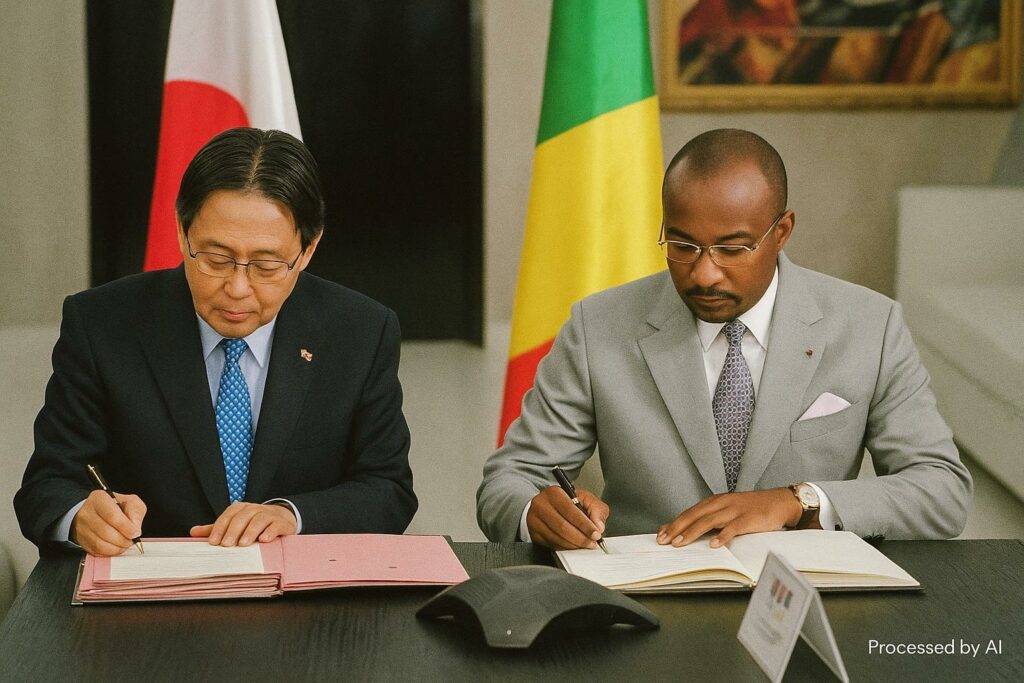A Strategic Signature in Brazzaville
The signing ceremony of 5 August in the marble-lined hall of the Ministry of Foreign Affairs drew a modest but symbolically dense audience of diplomats and senior civil servants. Minister of International Cooperation and Public-Private Partnerships Denis Christel Sassou Nguesso and Japanese Ambassador Hidetoshi Ogawa affixed their signatures to a document that had been negotiated for close to two years with the Japan International Cooperation Agency. The accord, described by the Congolese minister as “an engineering manual for shared prosperity”, frames future missions, the legal status of Japanese experts, and the financial channels through which Tokyo’s grants will be disbursed.
For Brazzaville, the timing is propitious. The National Development Plan 2022-2026 emphasises human-capital upgrading and infrastructure maintenance—precisely the areas in which Japan’s development diplomacy has traditionally excelled. Ambassador Ogawa, recalling three decades of Japanese grant aid that produced, among other facilities, the Talangai Trauma Centre, said the new instrument “provides a robust chassis on which our technical engagement can accelerate”.
From Agriculture to ICT: Scope of the Accord
Although couched in general terms, the annexes to the agreement outline priority sectors. Rural mechanisation and seed improvement programmes are to be paired with laboratory support for the Ministry of Agriculture. In health, Brazzaville Teaching Hospital is slated to receive diagnostic imaging equipment produced in Osaka. JICA officials have additionally flagged vocational training in mechatronics and civil engineering, leveraging the newly completed Pointe-Noire Technical High School that Tokyo financed in 2019.
Digital governance also figures prominently. A feasibility study will examine the interconnection of the Treasury, Customs and Port Authority data platforms, potentially lowering transaction costs for exporters of timber and refined petroleum products. Congolese officials argue that such connectivity, if realised, could add half a percentage point to annual GDP growth.
Diplomacy Behind Development: Interests Converging
Beyond economics, the accord testifies to a broader strategic choice. Tokyo has quietly expanded its Free and Open Indo-Pacific narrative to the Atlantic seaboard, favouring partners that offer maritime access and political stability. Congo’s Atlantic ports and its consistent voting patterns in multilateral forums make it a credible interlocutor.
Conversely, Brazzaville seeks to diversify partnerships while avoiding dependency on any single external actor. By codifying modalities for secondment and procurement, the present agreement complements existing mechanisms with the European Union and the China-funded Special Economic Zones, thereby enhancing the country’s bargaining power.
Implications for Congo’s Diversification Agenda
Congo’s fiscal accounts remain sensitive to hydrocarbons, which generated approximately 54 % of export receipts in 2022, according to the Ministry of Finance. The government’s medium-term objective is to reduce that ratio below 40 % by 2026. Training agronomists, constructing feeder roads and equipping logistics hubs—activities that Japanese cooperation traditionally supports—are therefore of more than symbolic value.
Analysts at the Economic Community of Central African States note that Japanese equipment grants, unlike some concessional loans, carry no sovereign-asset collateralisation clauses. That attribute could ease Brazzaville’s debt-management trajectory, already praised by the International Monetary Fund for its recent fiscal consolidation efforts.
Japan’s Africa Policy and the Congo Nexus
Since the eighth Tokyo International Conference on African Development in 2022, Japan has emphasised quality infrastructure and human-security principles. The Congo agreement aligns squarely with that template. Senior JICA adviser Keiji Okada argues that “capacity transfer, not just physical assets, is the metric of success”, adding that Japanese engineers will embed within Congolese ministries for multi-year rotations.
Such long-term presence differentiates the programme from short-cycle consultancy models and may foster peer-to-peer networks in fields ranging from disaster resilience to port management. Congolese technocrats, often educated in francophone systems, will thus gain exposure to Japanese kaizen methodologies, potentially enriching institutional cultures.
Prospects for Implementation and Monitoring
Both parties have instituted a biannual Joint Coordination Committee, chaired alternately by the Director-General of International Cooperation and the JICA Chief Representative in Kinshasa. The committee will evaluate key performance indicators such as trainee placement rates, equipment uptime and policy-adoption milestones.
Powered by Japan’s grant modality and Congo’s commitment to counterpart funding, the accord carries fewer execution bottlenecks than loan-financed megaprojects. However, logistical challenges—riverine access during the rainy season and limited fibre-optic redundancy—remain. Addressing them will test the agility of the new framework.
Still, the ceremony in Brazzaville marks more than another diplomatic handshake. It sketches a blueprint under which technical knowledge circulates, institutional capacity deepens and, ultimately, development becomes a co-produced endeavour. In the measured words of Minister Sassou Nguesso, “Our partnership with Japan is entering its operational maturity; the results will be tangible both in the field and in the statistics.”

